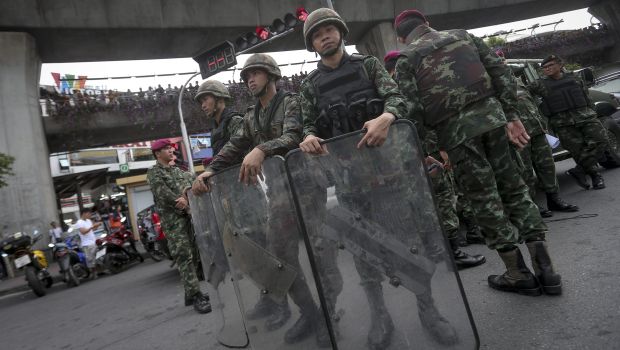
Thai soldiers stand guard during a protest against the military coup at the victory monument in Bangkok, Thailand, 27 May 2014. (EPA/DIEGO AZUBEL)
Hoping to show things are getting back to normal, the military also relaxed a night-time curfew brought in after it seized power in a May 22 coup, and is expected to speed up efforts to get the economy moving again after months of debilitating political protests.
Data on Wednesday showed trade shrank in April and factory output fell for a 13th straight month, underscoring the damage political unrest has caused and the tough job the military government faces reviving an economy on the brink of recession.
The team of advisers announced in a brief statement late on Tuesday included a former defense minister, General Prawit Wongsuwan, and former army chief General Anupong Paochinda.
The two men are towering figures in Thailand’s military establishment and have close ties to coup leader General Prayuth Chan-ocha. All three are staunch monarchists and helped oust Thaksin, who remains at the heart of the political crisis, in a 2006 coup.
A Reuters report in December revealed that Prawit and Anupong had secretly backed the anti-government protests that undermined the government of Thaksin’s sister, Yingluck Shinawatra. She was removed by a court on May 7 for abuse of power and the coup ousted remaining ministers two weeks later.
It is not clear what powers the advisers will have, but their appointment would suggest little prospect of compromise with the Shinawatras.
The military has sought to stifle opposition to its power grab, detaining scores of politicians and activists and imposing censorship on the media.
A military spokesman said 200 people summoned after the coup had been detained but 124 of them had since been released. Seventy-six were still being held, while another 53 people had not responded to a summons.
Yingluck and Suthep Thaugsuban, a former deputy prime minister in a rival government who led six months of protests against her, are among those who have been released.
Some pro-Thaksin activists have also been detained in the provinces, such as Chiang Mai in the north, the Shinawatras’ hometown and a hotbed of support, activists say.
Deputy army spokesman Winthai Suvaree said the army might soon release leaders of pro-Thaksin “red-shirt” activists, such as Jatuporn Prompan.
“Those released must tell us where they live and where they plan to travel,” Winthai said. “If they violate these rules they’ll be invited to meet us.”
Those being released are asked to sign a document saying they will not organize rallies, he said.
There have been daily, peaceful protests against the coup in Bangkok with crowds calling for elections and confronting troops, although the number of protesters dwindled to about 200 on Tuesday from about 1,000 on Sunday.
A seven-hour curfew the army imposed after the coup has been shortened to four hours, from midnight.
The junta’s new advisers also include Pridiyathorn Devakula, overseeing the economy. A former central banker, he was finance minister in an interim government after the 2006 coup, when strict capital controls were introduced to hold down the baht, causing the stock market to tumble 15 percent in one day.
Highlighting the task ahead, factory output fell 3.9 percent in April from a year earlier, the 13th monthly drop in a row.
The Commerce Ministry reported another slump in imports, down 14.5 percent in April from a year before as companies, unsure how the politics would develop, stopped importing machinery and consumers reined in spending.
Exports have not been able to offset the depression in the domestic economy: they fell 0.9 percent in April, although the ministry said it was hopeful for 5 percent export growth this year.
Thailand’s gross domestic product shrank 2.1 percent in the first quarter of 2014 as the anti-government protesters harassed ministries, damaged confidence and scared off tourists.
The military has moved quickly to tackle economic problems, notably preparing payments for hundreds of thousands of rice farmers that the ousted government was unable to make.
Some economists think the outlook could improve under the military, with the rice payments that will allow farmers to start spending again, a vow that a new budget would be on time, and new investment plans all boding well.
“We expect better economic activity in the second half, especially in the fourth quarter, along with improving external demand,” said Thammarat Kittisiripat, an economist with TMB Bank.
General Prayuth has not set any timetable for elections, saying broad reforms were needed first.
That may further complicate relations with foreign governments that have called for a speedy return to democracy, an end to censorship and the release of politicians, protest leaders, journalists and others detained.
“We’re going to have to continue to calibrate how we’ll work with the government and military when they don’t show any pathway back to civilian rule,” a senior US official told Reuters in Washington. “We’re very concerned and there will be an impact on our relationship.”
Thaksin has not commented on the coup except to say he was saddened and hoped the military would treat everyone fairly.
Years of political turmoil have polarized Thailand.
The Shinawatras’ strength is in the north and northeast, populous, mostly rural regions that have won them every election since 2001. Some Thaksin loyalists had vowed to resist a coup and the army and police are hunting for weapons.
Many Bangkok voters support the establishment and approve of the coup if it means ending Thaksin’s influence. They say he is corrupt and disrespectful to the monarchy. He denies that.
“This is a good coup,” said Chanchai Thonprasertvej, 54, a doctor at a small pro-coup gathering at Bangkok’s Democracy Monument on Tuesday. “The army can protect the land and the king. It will protect my country from Thaksin.”
